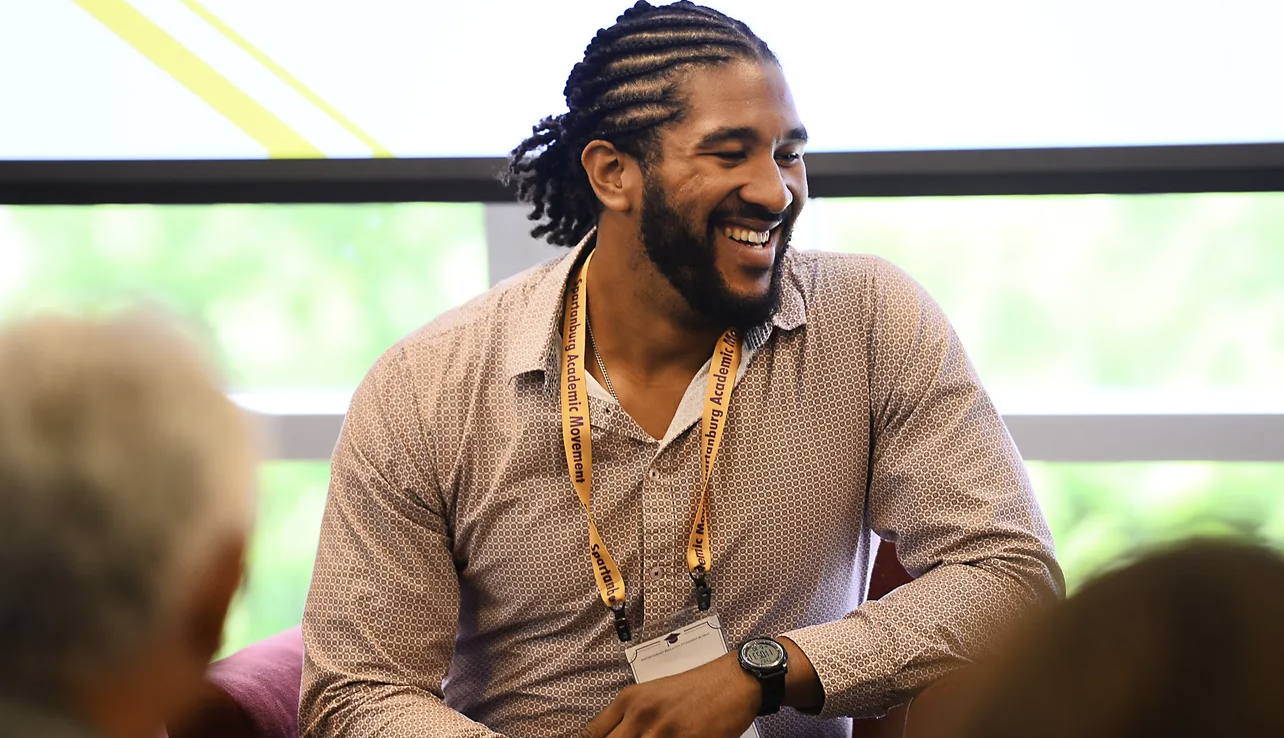The Spartanburg Academic Movement (SAM), a partnership of education, business, government, foundation, community, and faith leaders across Spartanburg County (SC), has launched a college attainment Steering Committee of two dozen of the county’s education leaders.
The committee seeks to advance Spartanburg’s economic vitality and overall quality of life by boosting college attainment rates, which for individuals influences higher incomes, better health outcomes, an active citizenry, increased tax revenues, and economic mobility.
Specifically, the committee is charged with guiding the development of a postsecondary education attainment action plan that builds on the OneSpartanburg Vision Plan 2.0 and energizes and engages diverse stakeholders and organizations. It has organized itself into the following four working groups:
Community Engagement and Retreat Planning
Ty Dawkins, Director at RD Anderson Applied Technology Center, and Dr. Boone Hopkins, President at Converse University (co-chairs)
Data and Effectiveness
Donette Stewart, Vice Chancellor at USC Upstate, and Beth Thompson, Data Manager at SAM (co-chairs)
Scaling Effective Practice
Dr. Michael Mikota, President at Spartanburg Community College, and Meghan Smith, Director - College & Career Readiness at SAM (co-chairs)
Piloting New Solutions Working Group
Scott Cochran, President at Spartanburg Methodist College, and Dr. Bennie Harris, Chancellor at USC Upstate (co-chairs)
As residents of Spartanburg County, the Steering Committee members believe we are a community of individuals whose success is interdependent. We are using an equity lens to drive our work and connecting with the people and organizations already dedicated to this work.
We are lifting up the many promising practices already underway while identifying those gaps and problem areas that are hampering our goal of increasing degree attainment for our County. Our work starts by listening to our community members, reaching people where they are, and ensuring diverse voices and perspectives are embedded in our plan.
We want to hear from you!
Will you share your perspective on college degree attainment? There are two ways to be involved:
Attend our virtual listening session on June 22 at 4:30 pm. We want to hear from you!
Provide (or encourage others to provide) a testimonial. Use your phone to write or record (audio or video) a 1-2 minute response that completes one of the following sentences:
One thing that helped/would help me complete my degree is…
Completing college is/was….
When I think about encouraging more Spartanburg residents to attend college, I wonder…
Other?
Submit your testimonial HERE or via QR Code below. Your testimonial will be shared with the SAM Steering Committee to inform a community action plan to increase college attainment.
SAM has a decades-long history of working to drive high levels of academic success for all children and adults.
Recent investments in SAM and the county’s education efforts mean there is now an opportunity to leverage existing work and accelerate the focus on postsecondary education attainment, building a pathway toward a more prosperous future, where all Spartanburg citizens can access college and meaningful careers by 2030. We welcome your engagement and feedback!Full membership of the Steering Committee:
Nayef Samhat, President - Wofford College
Tim Schmitz, Provost - Wofford College
Boone Hopkins, President - Converse University
Will Case, Associate Provost - Converse University
Scott Cochran, President - Spartanburg Methodist College
Ben Maxwell, VP for Enrollment - Spartanburg Methodist College
Bennie Harris, Chancellor - USC Upstate
Donette Stewart, Vice Chancellor - USC Upstate
Michael Mikota, President - Spartanburg Community College
Witney Fisher, Dean of Student Retention - Spartanburg Community College
Tim Kowalski, Founding Dean - VCOM – Carolinas
Matthew Cannon, Dean - Carolina’s Campus - VCOM-Carolinas
Karen Canup, COO/CFO - Sherman College
Kendra Strange, Associate VP - Sherman College
Randall Gary, Superintendent - Spartanburg School District 5
Jeff Stevens, Superintendent - Spartanburg School District 7
Darryl Owings, Superintendent - Spartanburg School District 6
Ty Dawkins, Director - RD Anderson Applied Technology Center
Erin Black, Spartanburg County Adult Education - Spartanburg Districts 1-7
Bill Brasington, Executive Director - Adult Learning Center, Inc.
Allen Smith, President - OneSpartanburg, Inc.
Russell Booker, Executive Director - Spartanburg Academic Movement
Meghan Smith, Director College & Career Readiness - Spartanburg Academic Movement
Beth Thompson, Data Manager - Spartanburg Academic Movement











